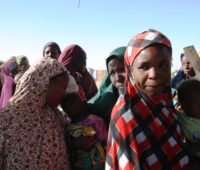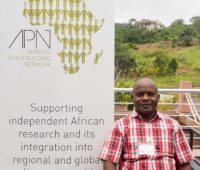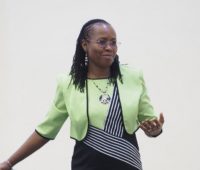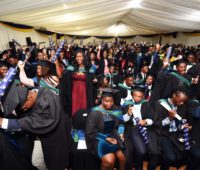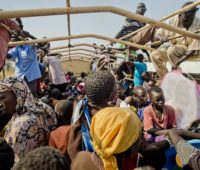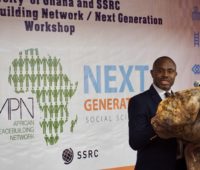The APN held a Media Experts Consultative Meeting on “Model Curriculum for Conflict-Sensitive Journalism in Africa,” in Accra, Ghana in collaboration with the University of Ghana from June 19th-20th, 2019. We had the opportunity to sit down with APN alumnus (IRG 2013) Admire Mare and ask him a few questions. The interview has been edited […]
Essays
Essays present critical analysis and debate on a pressing issue in African peacebuilding.
Rethinking Responses to Displacement in Northeast Nigeria
by Dr. Titilope F. AjayiAs a panelist at the maiden Kofi Annan Peace and Security Forum held in Accra in early September 2019, I was invited to reflect on the challenges facing internally and externally displaced populations in situations of violent extremism. In retrospect, I realize that there is a tendency and temptation to frame these primarily in terms […]
My PhD Journey: Reflections on the Next Gen Fellowship as a Game Changer
by John MwangiThe Next Gen fellowship awards made a great difference in the trajectory of my PhD journey from inception to completion in September 2018.
Points of Tension between African States and the International Criminal Court
by Maxine RubinThe International Criminal Court (ICC) has been accused of unfairly targeting African states. The ICC began operating in 2002 and it is the first permanent court that has the power to prosecute individuals for acts of genocide, war crimes, crimes against humanity, and crimes of aggression, which are considered as the “core crimes.” Accusations of […]
An Interview with 2019 APN Grantee Umar Ahmed
by African Peacebuilding NetworkUmar Ahmed is a lecturer at Usmanu Danfodiyo University, Sokoto, Nigeria. He received both his BA and MA degrees from the Department of Modern European Languages and Linguistics, Usmanu Danfodiyo University, Sokoto, Nigeria, and an MPhil in TESL (Applied Linguistics) from the University of Ghana, Legon. He later got his PhD in languages and literatures […]
An Interview with Professor Sarah Ssali
by Next Generation Social Sciences and African Peacebuilding NetworkThe African Peacebuilding Network (APN) and Next Generation Social Sciences in Africa (Next Gen) held a joint training workshop in Peduase, Aburi, Ghana from the 24th to the 28th of June, 2019. We had the opportunity to sit down with Dr. Sarah Ssali, Associate Professor and Dean of the School of Women and Gender Studies […]
Navigating the Research Terrain for Graduate Students in Africa: A Reflection
by Emilly Comfort MaracthoEarly this year, a woman I know from her public engagement in Uganda walked up to me after I had spoken at an event, politely requesting some of my time for a brief chat. We stepped aside and she poured out her heart—her master’s dissertation was not going well. She wanted me to give her […]
‘#ChurchToo’? The Women’s Rights Movement and the Sexual Emancipation of “Sacred” Spaces in Nigeria
by Dr. Titilope F. AjayiSexual abuse is about predation and power and the Fatoyinbo spectacle exposes the dark side of Nigeria’s Pentecostal ‘erotic economy’ with omnipotent pastors perched grandiosely atop.
Notes on Uganda’s “Refugee Paradise”
by Yusuf K. Serunkuma“…this thing is an industry; budgets are exploding…” An international refugee agency worker based in Kampala. By January 2018, media reports of a deal for Israel to deport rejected African asylum seekers and migrants to Uganda and Rwanda were still being denied. Believed to have started in 2013, deported African migrants gave testimonies to media insisting […]
Securing Peace and Stability in Africa: An Interview with Dr. Chukwuemeka Eze
by African Peacebuilding Network and Next Generation Social SciencesThe African Peacebuilding Network (APN) and Next Generation Social Sciences in Africa (Next Gen) held a joint training workshop in Peduase, Aburi, Ghana from the 24th to the 28th of June, 2019. We had the opportunity to sit down to ask Dr. Chukwuemeka Eze, Executive Director of West Africa Network for Peacebuilding (WANEP) who delivered a keynote speech on the first day of the workshop, a few questions.



